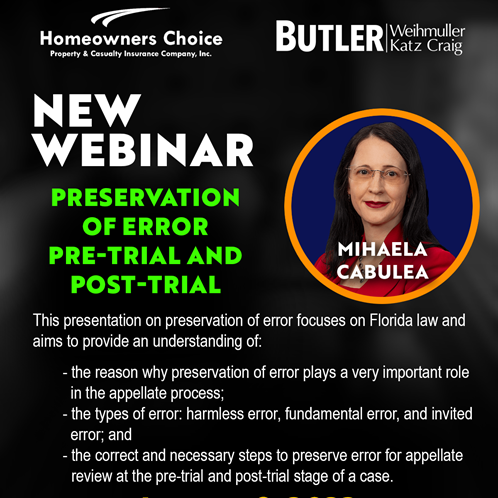
February 21, 2017
Last week the supreme court issued its opinion on the recommendations of the Florida Bar Rules committee regarding the new Daubert statute. The supreme court noted there are “grave concerns” those (unidentified) elements of the Daubert statute are constitutionally suspect. But, in the end, Florida’s Daubert statute is still the law of Florida – the Florida statute was not struck down or deemed to be unconstitutional. Practitioners still must comply with it.
This is the Florida supreme court’s first take on the Florida Legislature’s amendment to sections 90.702 and 90.704, Florida Statutes, that ordered courts not to apply the long-standing standard of Frye v. the United States, 293 F.2d 1013 (D.C. Cir. 1923) in Florida courts, and to stop the use of what is called “pure opinion” testimony.
The Florida Supreme Court issued its opinion after considering a report of The Florida Bar’s Code and Rules of Evidence Committee, which recommended by a close vote, that the court not adopt the Daubert amendment to the extent it is procedural. The supreme court voted 4-2 to follow the Committee’s recommendation, and in doing so, it declined to adopt the Daubert amendment to the Florida Evidence Code to the extent it is procedural. In re Amendments to the Florida Evidence Code, SC16-181, 2017 WL 633770 (Fla. Feb. 16, 2017).
The supreme court recognized concerns the new Daubert procedure may impinge on constitutional rights of access to the courts and the right to a jury trial. This is notable because Daubert has been the standard in federal courts and dozens of state courts for decades without such problems. The supreme court stated these concerns “must be left for a proper case or controversy.” The supreme court was clear that it “does not address the constitutionality of a statue or proposed rule within the context of the case of a rule,” like this one. So the Daubert amendment remains good law—for now.
But, if the new standard is applied in some future case, or if it has been applied in some case “in the pipeline,” where an expert has been challenged and the argument was made that Daubert impinged on a party’s “access to the courts” or “curtailed a party’s “right to a jury trial,” the supreme court could take up that future case and strike the law. But it hasn’t done so yet.
The Supreme Court of Florida will decide these issues in a future case, but the court’s recent opinion is not very heartening for Daubert proponents. Perhaps this is an issue that should be addressed by the Florida Constitutional Revision Commission and resolved through a constitutional amendment. If pregnant pigs are worthy of constitutional protections, the rights to be protected against junk science and pure opinion testimony, matters at the heart of the Daubert Amendment, deserve consideration during the current constitutional review process.
For any further questions, please contact Anthony Russo.



